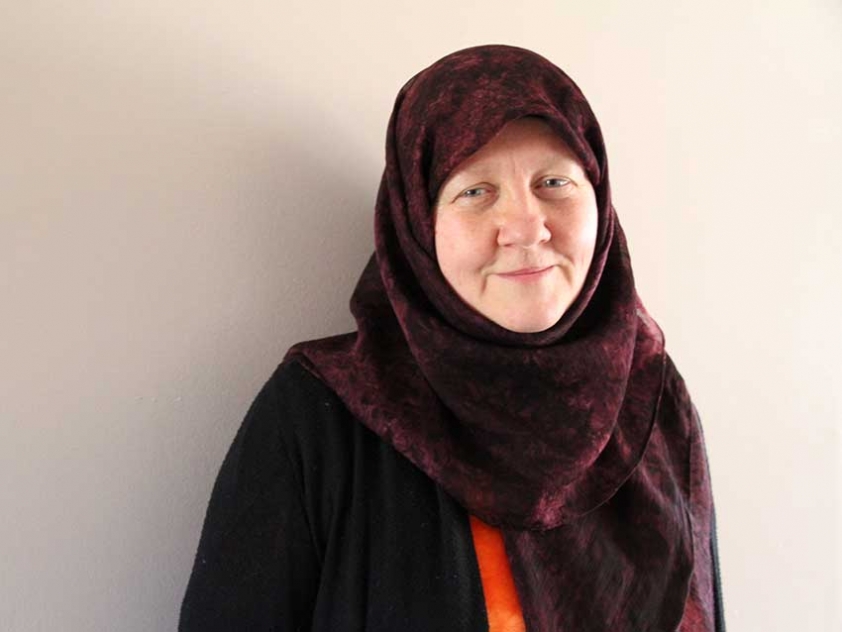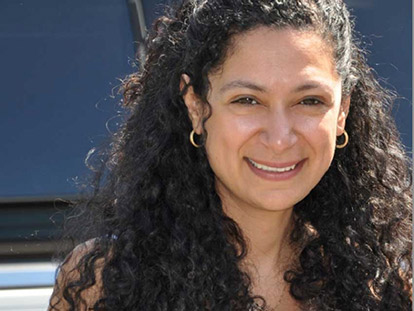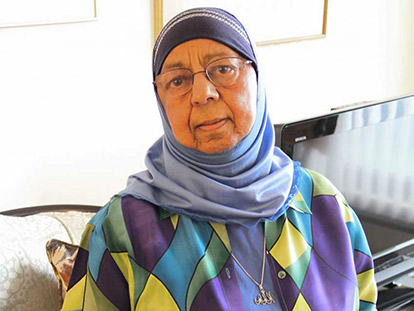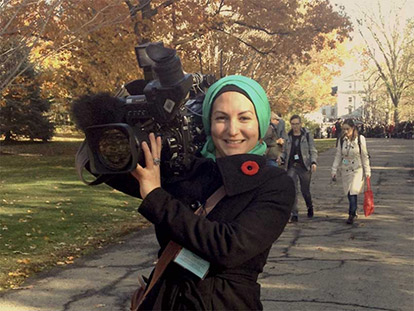 Barbara Helms is working to build bridges and challenge stereotypes about Islam in small town Ontario.
Courtesy of Khadijah Vakily
Barbara Helms is working to build bridges and challenge stereotypes about Islam in small town Ontario.
Courtesy of Khadijah Vakily
Apr
Barbara Helms: Challenging Stereotypes about Islam in Small Town Ontario
Written by Khadijah VakilyOne Muslim woman is devoting much of her time to raise awareness about Islam across small town Ontario through a series of presentations and interfaith dialogue.
Barbara Helms was born in Saskatchewan to American parents, who were both accomplished classical musicians teaching in Canada. Shortly after she was born the family moved back to the United States, where Helms was raised with her older sister in Princeton, NJ. She returned to Canada in her 20s to study at McGill University.
Originally planning to become an Anglican minister, she embarked on a much broader spiritual journey while earning her BA in Comparative Religion, later converting to Islam in 1987.
“I had become open to Islam through my studies as I found that its theology and the development of its sacred scripture made sense. However, it was a series of intense spiritual experiences that inspired me to convert. These experiences were similar to states I had experienced as a Christian, only more intense, which I understood as coming from the same source but more directly,” says Helms.
Shortly before her conversion she married her fellow classmate Abdollah Vakily, and would go on to have six children with him. After moving to Cornwall, Ontario in 1993 in search of a Muslim school with English as the language of instruction, they enrolled their sons at Al-Rashid Islamic Institute, the first Islamic boarding school in North America of its kind. Helms’ two sons would go on to complete the Hafiz and Alim programs there, while her daughters attended the girls’ day school (focused on secular studies within an Islamic environment). A significant portion of the local community is built from families who have migrated to the city seeking this niche environment of religious study instruction. Ottawa's own Sikander Hashmi, imam of the Kanata Muslim Association, is a graduate of this institution.
Unlike the more multicultural city of Montreal, it was somewhat isolating for Helms to then be one of the only white converts in the primarily South Asian community of Muslims. With further advancement in university now having the added strain of commuting, Helms put her studies on hold to focus on raising her children. She switched back and forth for several years between home-schooling and volunteer-teaching, before helping found Dar-ul-Ihsan Muslim School in 2001. She was employed at the school as a principal, teacher, and administrator. The school gained secondary accreditation from the Ontario Ministry of Education, but was forced to close in 2007 due to lack of consistent funding. She then continued in the position of Executive Director for the parent organization, Dar-ul-Ihsan Centre for Islamic Education, which was by then a registered Canadian charity.
Within the Cornwall community, Helms has been active as an educator and pastoral care worker for many years, working with both Muslims and non-Muslims.
“I also understand that since I have spent three decades bridging different cultures, it is quite natural for me to function as a cultural broker,” she shares.
Helms has been involved in numerous community educational events, from presenting issues related to Islam in schools, churches and other local organizations, to giving cultural sensitivity training to groups such as the Cornwall Community Police Services, Ontario Media Relations Officers Network, and the Canadian Mental Health Association.
“The most consistent work, however, has been done in the context of the Cornwall Interfaith Partnership (CIP) and a related series known as Muslim-non-Muslim Dialogue, which has which has been hosted jointly by Dar-ul-Ihsan Centre and Knox-St.Paul’s United Church’s Journey Together Program,” says Helms. “The success of these efforts is also linked to our partnership with Knox-St. Paul’s Reverend, Donald Wachenschwanz, who has been a constant source of support and an advocate for meaningful dialogue with the Muslim community, as well as from the contributions of Brother Mustafa Elgazzar who is a fellow CIP member and long-time pillar of the local Cornwall Muslim community.”
Helms first became involved in Islamic exposition when she began writing editorial pieces for local newspapers in response to misinformation that appeared in some of the syndicated opinion pieces and local letters-to-the-editor. She was subsequently invited by the editor of the Standard Freeholder to write weekly columns on Islam for the paper’s faith section. After writing for nearly two years and becoming more well-known in the wider community, Helms was asked to be the featured speaker for the Cornwall Public Library’s Community Reads program, which happened to be focusing on novels set in Afghanistan. This allowed for a broader discussion on Islamic practices to be incorporated in the public setting.
“From there, I was asked to join the newly forming CIP. In this way, the public exposure and media coverage of these projects has generated more projects,” she states.
Helms feels it is important to hold these types of events as it gives non-Muslims a chance to ask questions and make their own discernments.
“People outside of the Muslim community have been exposed to so much fear-based misinformation that they deserve to have the opportunity to become better educated (…) I try not be impose my views on my audience, but give them a chance to understand the wide variety of opinions and practices within the Muslim community, as well as significant distinctions such as the difference between religion and culture, and the range of interpretations and affiliations. This helps them to see that Islam and Muslims are not monolithic concepts,” explains Helms.
Helms also tries to be honest and transparent in addressing the issues and challenges that are evident within the Muslim community.
“It is important that our interfaith colleagues and neighbours have a chance to interact with actual Muslims who respect them and who take their concerns seriously—as opposed to the shadowy stereotypes they may be fearing in their imaginations,” says Helms.
While Helms stated that the reception to her talks has been overwhelmingly positive, she has found that being in the public eye can make one an easy target for criticism, including negative feedback and threats.
“This criticism is seldom face-to-face, but generated by people I don’t know through letters-to-the-editor and offensive online posts,” she shares.
The negative feedback has not been limited to just the non-Muslim community. In general, the religious community in Cornwall tends to be more reserved. There is often a mistrust towards the mainstream media, as there is a fear of being misquoted or wrongly painted as extremists. Much like many Christian and Jewish religious orientations, there are several subgroups within the community that differ greatly in terms of how they engage with not only those of differing faiths, but also those with differing interpretations within the same faith.
Despite the city’s relatively small population of 46,000, there are multiple mosques and prayer centres within blocks of each other, displaying some of the obvious division. These sorts of issues have led to an absence of long-term interfaith dialogue and social engagement, areas that Helms has tried to navigate through with the varied groups of diverse religious ideologies.
“There are also challenges coming from within the Muslim community, such as the negative response of (certain) members who feel that Muslim women should not have public roles. This criticism is seldom expressed to me directly, but I am aware of its presence and impact,” says Helms. “In addition, there are many who are hesitant to engage in interfaith dialogue out of concern that it will require compromises in issues of faith and etiquette. So these attitudes create resistance to these event and discourage other Muslims from participating.”
According to Helms, there is also a large segment of the Islamic community that—while not critical of the work itself, is pre-occupied with replicating the Muslim environments that are familiar to them. This approach makes it difficult to engage the adult Muslim population in meaningful interaction with the larger non-Muslim society.
“After a while, I found that I was doing “presentations” rather than facilitating mutual interfaith dialogue, and I began to hear comments such as ‘we know you and we know more about Islam, but where is the Muslim community that we are trying to understand and get to know?’ As a result, I have tried a different approach by involving more Muslim youth to represent the community and bypassing the more disengaged adult population. This has been very successful, as the youth have been generally more articulate and motivated than their parents and leaders,” she explains.
Helms hopes that her presentations help inspire people to develop a sense of accurate discernment and to find out about Islam and Muslims through positive engagement with the Muslim community instead of distrust and avoidance.
“I hope that the experience of listening to actual Muslims and being able to ask questions—including those politically incorrect questions that really concern non-Muslims but which they are afraid to vocalize—will prompt people to think, to question unsubstantiated negative assumptions about Muslims. I would also like these talks to help prompt the Muslim community to address many of its present dysfunctions so we can be a more reliable and transparent partner in this dialogue,” says Helms.
As far as her own non-volunteer work goes, Helms decided to retrain in a different field, finishing a Masters in Counselling Psychology from Athabasca in 2014 and recently she is starting to work as a psychotherapist with Integrative Counselling Services. She plans to continue her post-secondary endeavours by pursuing a Doctor of Ministry degree at Emmanuel College through the Toronto School of Theology in the area of Muslim Chaplaincy—combining her interests in Islamic studies, interfaith dialogue, pastoral care, and counselling. Despite the busy schedule, she still plans to continue with facilitating talks on Islam for the general public.
“I have really enjoyed this work. Although there is a lot of anti-Muslim sentiment, I have met so many sincere non-Muslims who are open to dialogue and regard Muslims with genuine respect that I am left with a sense of hopefulness for our society and for our future as Muslims here in Canada,” she concludes.
*Khadijah Vakily is Barbara Helms' daughter.
This article was produced exclusively for Muslim Link and should not be copied without prior permission from the site. For permission, please write to info@muslimlink.ca.















